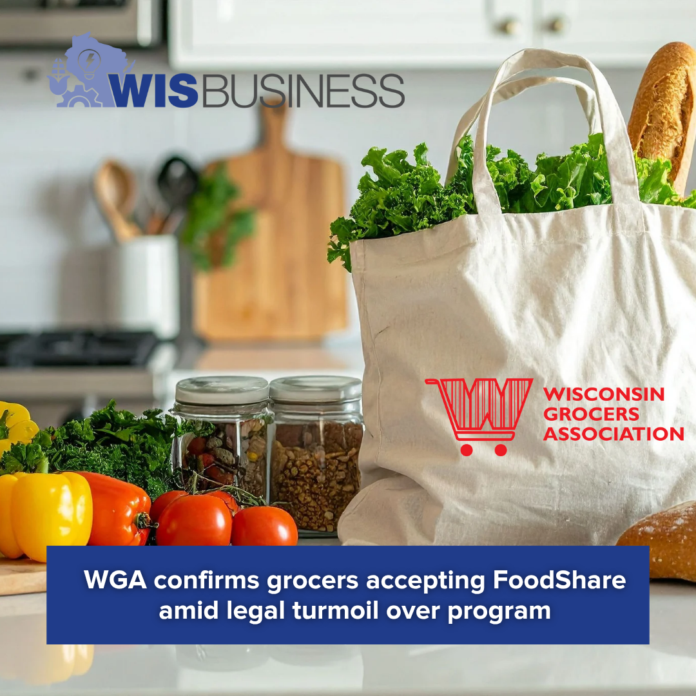The Wisconsin Grocers Association has confirmed grocers across the state are accepting FoodShare after state agencies called on retailers to keep taking the benefits amid legal turmoil over the program.
The departments of Health Services and Agriculture, Trade and Consumer Protection yesterday issued a release warning businesses in the FoodShare program that recipients can’t be refused service for paying with their QUEST food benefits cards.
QUEST cards function like a debit card, and can be used to buy food at businesses that have agreed to be part of FoodShare, Wisconsin’s name for the Supplemental Nutrition Assistance Program, or SNAP.
WGA yesterday said FoodShare benefits remain usable at authorized retailers in the state, and are being accepted by grocers despite the “unprecedented chaos” with the program. The group says this situation is leading to concern and “misinformation” that it’s seeking to clarify.
“Our members are on the front lines every day,” WGA President and CEO Mike Semmann said in a statement on the FoodShare issue. “They are providing a service to their communities. They are helping families, calming fears, and making sure no one goes without food. That’s the reality.”
DATCP Secretary Randy Romanski says the agency wants to “make sure everyone is clear on expectations.” A spokesperson yesterday said the agency hasn’t received any complaints and isn’t aware of any instances of Wisconsinites being unable to use their FoodShare benefits at stores.
Evers last month signed an executive order prohibiting price gouging due to the loss of FoodShare funding, declaring a state of emergency amid the economic disruption caused by the federal government shutdown.
Semmann argues the order wasn’t needed.
“Grocers did not need an executive order to do the right thing,” he said. “They’ve been doing it all along. From helping seniors navigate benefits to donating to food banks, Wisconsin grocers are stepping up, not stepping back despite the continued court action and funding questions.”
The WGA says grocers in the state have done everything they can to reduce the impact of the government shutdown.
Yesterday’s agency guidance comes after Dem Gov. Tony Evers rejected the Trump administration’s recent memo urging states to “immediately undo any steps taken” to issue SNAP benefits for November. That memo warned that failing to comply could result in USDA cancelling the federal share of state administrative costs and holding states liable for “any overissuances” resulting from disobeying the guidance.
In his response over the weekend, Evers said the state legally added benefits to its FoodShare cards for nearly 700,000 state residents including 270,000 kids under an active court order.
Meanwhile, a federal judge has temporarily blocked the administration from forcing states to reverse a portion of the FoodShare payments.
Evers yesterday joined a coalition of states seeking to prevent the Trump administration from requiring states to claw back food stamp benefits sent out last week. At a stop in La Crosse to tour a local food pantry, Evers blasted President Donald Trump, charging him with trying to take food away from people who need it.
“The fact that they’re trying to claw that back, that’s embarrassing. That’s embarrassing for any president of the United States, whether it’s Donald Trump or somebody else,” Evers said.
The development is the latest in an ongoing legal battle with states over the aid. The Trump administration has sought to withhold emergency funding for SNAP benefits during the government shutdown despite previously saying the funds could be used. Senators in Washington are currently discussing a plan to reopen the government, which could potentially provide financial relief in the coming days.
Several states released November food stamp benefits last week after the USDA said it would comply with a federal court order requiring it to fully fund the aid. Wisconsin released $104.4 million for the payments.
However, the Trump administration filed an emergency appeal with the U.S. Supreme Court, and a justice late Friday granted a stay of the lower court’s ruling. USDA late Saturday then informed states that they should only load payments reflecting a 35% reduction in the maximum allotment for November. It also directed any states that sent full SNAP payments to immediately undo those steps, saying the action wasn’t authorized.
The multi-state petition that Wisconsin joined challenges the latest directives and cites a “continual state of whiplash” due to conflicting guidance from the Trump administration.






